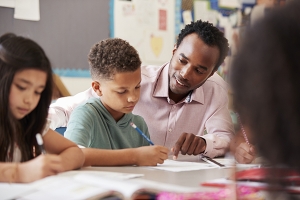
It’s not uncommon for parents to wonder if children are learning and developing at the same pace as their peers. Many first-time parents have little understanding of what today’s kindergarteners are expected to know and process, and most only begin to think about kindergarten when their child turns 4. The earlier parents play and communicate with children in a positive, inclusive and inquisitive way, the sooner their brains are trained to problem solve and learn to develop healthy relationships with peers.
Kindergarteners are expected to understand turn taking, waiting and sharing. These skills are best taught at the dining table and during basic game play. Modeling empathy and fair play at home supports success in the classroom; and a child with strong and happy parental attachment will have greater success at being away from home.
“Social-emotional readiness is more important than academics in child development,” says Mary Moser Cooper, a therapist and a respected authority on early childhood. Moser Cooper recommends parents visit www.zerotothree.org to learn toddler milestones and supports for purposeful play.
So, what are the best ways for parents to prepare children for kindergarten? Jan Garon, a TK (transitional kindergarten) and kindergarten teacher in San Diego Unified School District, suggests these five activities:
Read
Reading is the single most important thing a parent can do with children. To prepare kids for her class, Garon suggests parents ask questions while reading. “Ask your child, ‘What do you think happens next?’ Give them time and space to answer. Parents jump in too fast,” says Garon. Let them imagine, help them understand the story timeline and instill a belief that their opinions count.
Interact
“Singing the alphabet song is a waste of time,” Garon says. Children need to recognize letters in and out of sequence. More importantly, they need to recognize the sound each letter makes, which enhances reading ability and sounding out complex words with multiple syllables. “Teach lowercase letters, too,” Garon adds, “because 85 percent of the letters we read are lowercase.” Many toys and visual aids only feature uppercase letters.
Colors and shapes are best learned contextually. Consider asking children to name items that are round or shaped like a circle, rather than asking them to identify a two-dimensional line image of the shape. Ask children to name all the green items they can think of instead of showing them a leaf and asking them what color it is.
When it comes to number sense, understanding that 10 objects signify a group of 10 is more important than how high a child can count. As with letters, understanding numbers out of sequence is important. Garon says a child who understands that seven comes before eight, and that four objects equal the number four, is further ahead than a child who can simply count to 50 from rote memorization.
Practice
Kindergarteners need to know how to safely handle a pencil sharpener, scissors, pencil and crayons. Have children practice cutting with safety scissors, play with mega blocks and dig tiny toys out of Play-Doh. These activities help build finger strength and hand coordination required for most kindergarten tasks.
Be Prepared
“Have you talked about emergency plans at home?” Garon asks. If not, it’s time. The first week of school is usually about safety and physical boundaries, and children participate in a fire drill. Kindergarteners often line up over and over during the first week to get familiar with school grounds so they know where to go if they become disoriented or lost. “Children should know their full name, birthday and ideally, their phone number,” says Garon, “so they can seek help in an emergency if the most commonly recognized adult is out of sight.”
Teach Independence
Children need to entertain themselves—on their own—when they have completed an activity or task at home. Why? Not all students finish assignments simultaneously at school, and kindergarteners are expected to find quiet play activities while they wait for peers to finish.
Self-help skills are imperative in the classroom. Parents should teach children how to open their pencil boxes, school bags, lunch containers, etc. Opening a chip bag is challenging for some kids, as are zippers and buttons.
Teach proper restroom etiquette: kindergarteners should know to close bathroom doors during use, to wash hands with soap, and to manage their own clothing.
If children have the basic knowledge listed here, a skilled teacher can help prepare them for first grade.
For more information about developmental milestones and where to get help if your child is not meeting them, talk to your pediatrician and visit these websites: www.zerotothree.org, www.first5sandiego.org and www.SNRFSD.org.
Emily Dolton is a SNRFSD resource parent and mom of two, one with 22q 11.2 Deletion Syndrome.
Published February 2018
--------

















